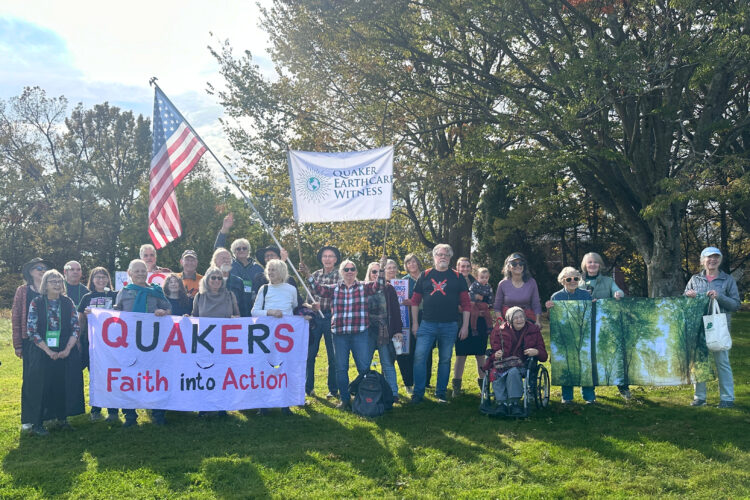Building a New Foundation for Spirit-Led Ecojustice Action The Role of Emergent Values in Prophetic Witness
By Climate Action Committee of the Radnor Quaker Meeting
As Quakers, we’re called to notice how prophetic witness influences our lives. What is prophetic witness? It’s the idea that the spirit may inspire us to recognize an injustice, or to seek what is good, just, true or somehow right, before the world completely or clearly perceives it.
Prophetic witness points to an unrealized ideal. It is an act of faithfulness, of fidelity to the work of spirit within the stream of our lives. We have come to recognize prophetic witness at work through Quaker role models: George Fox, Margaret Fell, William Penn, Mary Dyer, Benjamin Lay, Anthony Benezet, Lucretia Mott, Susan B. Anthony, Bayard Rustin…to name a few.
Those who give voice to prophetic witness channel the work of the spirit within the world. They are not perfect. We do not see them as saints, or as more than human. As Quakers, we can all hope to see ourselves joyfully carrying forward their tradition of courageous openness to continuing revelation.
We say courageous because prophetic witness calls us to move against the grain. So, we encounter disturbances to our individual, internal sense of peace—between active Quakers and the outside world; and within Quaker communities.
Quakers, of course, seek peace. Yet our commitment to nonviolence does not insulate us from conflict and pain in spiritual work. On the contrary, our openness to spirit may infuse our lives with turmoil. Lives that speak—lives of integrity, lives synchronized with the energy of spiritual revelation—are tumultuous adventures. Prophetic witness that begins as a “still, small, voice” can become an unsettling roar.
The Quaker process is hard work, as we struggle to form consensus. All the while, our struggle involves deep listening, deep discernment, and summoning the integrity to walk our talk.
In the Spirit of SPICES, Can a Set of Emergent Values Focus Ecojustice Work?
How could we reduce the greenhouse gases emitted from our home Meeting and its membership? We arrived at spiritual unity about the goal’s importance. Yet when proposals involved significant financial investments, our united resolve evaporated like moisture in the increasingly hot Pennsylvania summer. New questions arose. Would heat pumps keep us warm in the winter? Perhaps a roof replacement posed a more pressing need for our available capital?
Often, our level of commitment is revealed within the crucible of action-oriented decisions. Can we say we believe in racial equity if we are unwilling in this moment to relinquish privileges that thwart that equity? Can we say we believe in nonviolence as long as we benefit from state-sanctioned violence against desperate people in the name of protection of our homes or borders? Can we say we want peaceful, Earth-friendly food systems if we decline to adopt animal-free diets? Can we say we wouldn’t impose suffering on other sentient beings as long as we’re willing to have them subjugated or slaughtered? Quaker committee projects spotlight the real-life challenges that prophetic witness confronts in the world, and test our resolve to transcend our own resistance to change.

Our Climate Action Committee examined Quaker values in the context of planetary crisis. The SPICES testimonies, which many Quakers consider a summary of our core values, are: Simplicity, Peace, Integrity, Community, Equality, and Stewardship. How might we draw on and build out these values to support Quakers’ prophetic witness in ecojustice? For example, if stewardship of our old, beautiful meetinghouse weighs against global ecojustice priorities, how would we update this guidepost to facilitate climate action?
If ecological integrity means integrating the Quaker life with Earth’s systems and communities, that is because we are led to make it so. Paul Buckley (author of the Pendle Hill pamphlet Quaker Testimony: What We Witness to the World and many other Quaker publications), observes:
What is essential is that the source—the origin—is not our reason or our tradition or our personal preferences. So, for example, if I engage in peace work because it makes me look good to people I admire, it isn’t a testimony. It may well be good work, valuable work, important work, but it isn’t a testimony. Second, you must testify to a testimony. In other words, it has to be public behavior…
This invokes the “integrated life”—one in which our daily decisions mesh with our set of values.
A testimony calls us to act outside our personal comfort zones. Further, it calls us to take up the hard work of challenging the comfort zones of others. We apply this understanding to our commitment to break away from practices and conveniences that cost the Earth, and that artificially separate us from the plight of a long unheeded, neglected planet—all its systems, all its living communities.
Here is our emergent set of values—building on SPICES, guided by responses from within our Meeting, from ecojustice-minded members of Philadelphia-area Meetings, and, we hope, from the readers of BeFriending Creation. (EMERGE values on next page)
We seek an Earth restored from its depleted, destabilized state. From the unnatural wildfires. Degradation of waterways. Dangerous weather extremes. The bleak reality that so many habitats and their living communities are dying—and not of natural causes.
Just as the SPICES guide Quaker attitudes and engagement, the acronym EMERGE, we believe, can serve as a touchstone as we commit to live in right relationship with our Earth, its finite components, and its intricate web of life. The acronym EMERGE signifies a transformation from our current state to a new way of living as we take each letter and progress from Empathy, Mindfulness, and Ecological Integrity, to Right Action, Growth, and finally, Endurance.

As the Struggle Goes On, Can Continuing Revelation Guide Spiritual EMERGEnce?
We’re asking ourselves: Are we prioritizing energy-use reduction and groundskeeping in harmony with nature? Are we promoting respect for untamed life in and around our township, county, and region? Can we promote efforts to reduce car dependency in our community? Could animal-free offerings be the default in our food-sharing plans? How can we contribute to other Quaker climate and ecojustice working groups? How can we help climate refugees?
As a basis for this work, we imagine a humanity that understands community, the web of life, our connection to all beings and to spirit as indispensable joys! Committed to this possible future, we envision our EMERGEnce—from a human-driven crisis into a deeply committed love for our planet, its systems, and all its precious living, evolving communities.
EMERGE, we hope, offers a basis for deep and serious discussions, as the traditional Quaker SPICES testimonies do. Like SPICES, EMERGE is not an end in itself; it is a touchstone. It guides inquiry in our own hearts, in each other, and together. It offers some ideas as to how we might become essential workers on the planet. One and all.
While this is submitted by members of the Climate Action Committee of Radnor Quaker Meeting—David Castro, Burt Dallas, Lee Hall, Steve Olshevski, and Wayne Roberts—we envision EMERGE as something that has no named authorship, something than belongs to all who wish to support this work. Special thanks to LouAnne McDonald and Craig Long, whose words are woven into parts of this piece.
This work continues on our dedicated website: EmergeValues.org
EMERGE
Empathy. The aspect of love that lets us feel…together. Marcus Rediker, author of The Fearless Benjamin Lay, shows us how this now-famous abolitionist Quaker’s “one and all” commitment to mutual aid included sentient beings as our whole community. Spirit, all-encompassing! David Lester, illustrator of Prophet Against Slavery, adds: “He didn’t ride horses but walked instead, because he didn’t want to use animals as some sort of beasts of burden.” This same, deep respect for all life experiences, says Lester, propelled Lay’s “outrage to go to Quaker meetings and point out who was a slave owner…when most people of European descent considered slavery natural.”
Mindfulness. Donald W. McCormick, a member of Grass Valley Friends Meeting in Nevada City, California, has explored Quaker mindfulness in the act of listening for spiritual messages in Quaker Meeting for Worship. In a parallel way, we listen for messages from our Earth and the living communities it supports. We feel the impact of what we do, or refrain from doing—across systems, across time, across communities, throughout the web of life. Within mindfulness is a relentless sensitivity to the effects of unmindful privilege—around us, and around the world. Those with the least resources, and those who cannot easily move, are the most impacted by climate chaos and biodiversity loss.
Ecological Integrity. Ecology—the study of living beings as interconnected with their environments—comes from the Greek oikos: house or habitat. In empathy with all Earth’s communities—our housemates—we commit to listen and learn. We ask: Is the Quaker testimony of stewardship optimal for attaining right relationship with the natural world? The untamed communities are their own true stewards. The acknowledgements we make to them must be made with sorrow and humility. Attending to messages from spirit, we’re striving to perceive not only the wrongness of humanity’s impact at this moment, but the possibility of who we could be.
Right Action. This involves questioning the benefits we get in an economy based on extraction of resources from Earth. Discerning right action involves following the Quaker testimony of simplicity, as we strive to live within our ethical means on a finite planet. To simplify our lives, and support each other’s efforts to do so. Right action considers vulnerable people, and present and future generations of all living beings. We acknowledge that what Earth produces are not the fair spoils of the privileged. Nor are they humanity’s resources alone.
Growth. Growth is a popular term in economic circles, but our focus is spiritual growth. Consider the evolving perception of Gus Speth, who has served as Administrator of the United Nations Sustainable Development Group. Speth once thought the top global environmental problems were biodiversity loss, ecosystem collapse and climate change. Speth later said:
But I was wrong. The top environmental problems are selfishness, greed and apathy, and to deal with these we need a spiritual and cultural transformation, and we scientists don’t know how to do that.
What could “spiritual and cultural transformation” look like? Perhaps a deep shift in our idea of ourselves: the emergence of a humanity whose mindful living reintegrates us with our Earth. We could then free ourselves to define affluence by its true meaning: a flow. And the life-saving results could happen relatively quickly, for we’ll be siding with the power of nature. Put us in, Coach.
Endurance. We return to Benjamin Lay for an illustration of passionate persistence—the courage to endure in the face of apparently impossible odds. The paradox of Lay’s prophetic witness? While insisting on the immediate end to repressive hierarchies, Lay wasn’t confined to short-term or even lifetime goals. Prophetic witness often points to an ethical promised land we won’t live to see. Almost all major Quaker concerns share this character: racial justice, LGBTQI+ advocacy, economic justice, nonviolence, support for migrants, and ecojustice. Benjamin Lay valued an eternal principle, which says the time to speak out for a fairer future is now.

